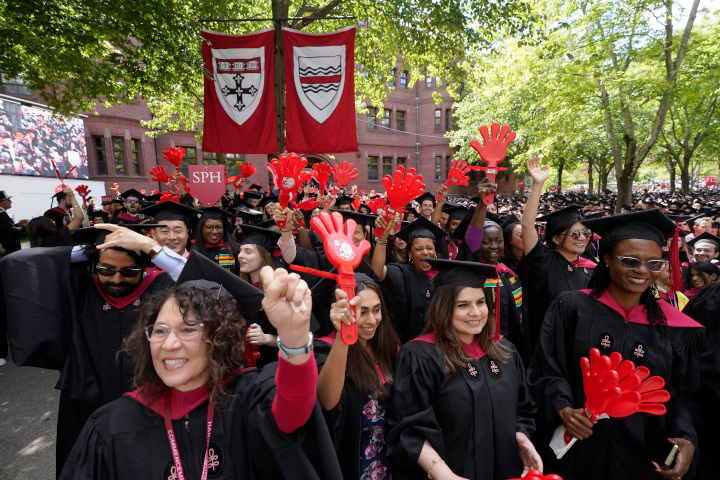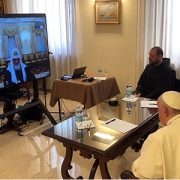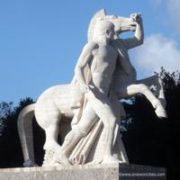
AP Photo/Steven Senne
«We have no illusion that Harvard alone can readily bridge the widely different views of the Israeli-Palestinian conflict, but we are hopeful that, as a community devoted to learning, we can take steps that will draw on our common humanity and shared values in order to modulate rather than amplify the deep-seated divisions and animosities so distressingly evident in the wider world», the school’s leadership said.
This statement followed Harvard’s previous president, Lawrence Summers’, severe criticism of the university not dissociating itself form a letter signed by a 31 student organization at Harvard, but which concealed the names of the students who authored and signed it. Courage indeed.
Summers noted that «Unlike [former] President Bacow’s strong statement of support for Ukraine after Putin’s invasion and the decision to fly the Ukraine flag over Harvard yard… we have as yet – 48 hours later – no official Harvard statement at this time of moral testing. Instead, Harvard is being defined by the morally unconscionable statement coming from student groups blaming all the violence on Israel. I am sickened. I cannot fathom the Administration’s failure to disassociate the University and condemn this statement.
Is Harvard leadership’s adjusted statement few days later referring to «common humanity» any better? They obviously forgot Confucius’ «Men’s natures are alike. It is their habits that carry them far apart». Recent events show just how far.
It is not clear, though, why Summers or anyone would be surprised by Harvard’s faculty and students. A Similar frame of mind has characterized Harvard’s history for decades.
The late Alexander Gerschenkron, a Russian-born Harvard historian delivered a lecture at the University on April 11, 1968. Two days before, hundreds of students and professional activists carried «Fight Capitalists – Running Dogs» banners, shouted Sieg heil, demanded the abolition of the Reserve Officers’ Training Corps (ROTC) program, occupied University Hall and renamed it «Che Guevara Hall», and shoved faculty and administrators down stairs while shouting expletives.
These events prompted an emergency meeting of the Harvard faculty, where Gerschenkron delivered his speech, broadcasted uncensored on the radio. «I hear all this talk about the imperialist war machine, but any man in reasonable possession of his reasonable powers must understand that this is all bunk, this is mendacious low, political talk…. This faculty is not the proper guardian of academic freedom either…. Sixteen, 17 years ago, when academic freedoms were threatened brutally and viciously» by Senator Joe McCarthy, «it was not the faculty who stood up against the threat. The faculty was subdued, scared. Let us take once a candid look at ourselves, at this faculty».
Some are buried in research and do not want anything to do with the wider world. Then, «there are the middle-aged popularity kids who have done considerable damage to the university. In addition to popularity seekers, they are fearers of unpopularity», especially «in the atmosphere of terror – fear of boycotts, of reduction in election in their courses».
These words were introduction to the most devastating part of his speech, relying on Hans Christian Andersen’s The Most Incredible Thing tale – which surprisingly anticipated both 1968 and these days’ events.
The story is about a king’s promise that whoever does an incredible thing will win his daughter’s hand in marriage and half his kingdom. The contest’s judges promptly agree that a young, decent entrepreneur had earned the prize by devising a clock that had 12 different performances, one for each hour.
The 12 performances reminded the audience about the myths and foundations of Western civilization, from Moses’ commandments to Christianity and basic pleasures of everyday living – that elusive «common humanity».
As the prize is about to be awarded, a new young man appears, swinging an ax and smashing the clock. By so doing, he claims, he has done the most incredible thing. The judges and the people agree, and award the princess and half of the kingdom to the lout – as much of the media and universities do these days.
However, the fairytale has a happy ending. On the wedding day, the clock – Phoenix-like – reappears as new. The characters in the 12 performances come to life and send the lout into oblivion. The innovative, good young man gets his rewards. Andersen optimistically concludes that a work of art does not die. Its solid incarnation may be shattered, but its spirit cannot be broken.
Although the people at the wedding declare that they lived to see the most incredible thing, the story ends with the observation about what made the ending of the tale truly incredible (that Gerschenkron omitted mentioning). Nobody in the crowd was envious of the «start-up» young man who built the clock and married the princess – which is not the habits of thought of large segments of the population these days, within academia in particular.
Gerschenkron then concluded: «The spirits of the faculty will [have to] rise and smash up all this criminal nonsense that is going around in this country». The university, he added, is a fragile creation that louts can destroy just as one lout destroyed the clock in Andersen’s story. Sometimes it takes a fairytale to remind us how thin is the veneer of civilization, how delicate the complex of institutions that uphold it, and how easy it is to forget what kind of culture and character can sustain them.
This article, which appeared previously at Real Clear Markets, draws on Reuven Brenner’s How the 2008 Financial Crisis Did Not Change the World, American Affairs, Spring 2019. Reuven Brenner is a governor at IEDM (Institut Économique de Montréal). He is professor emeritus at McGill University (Montréal, Canada) and is a member of the Royal Commission.





